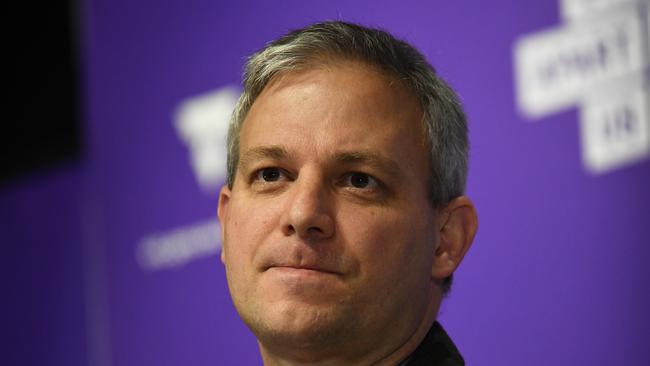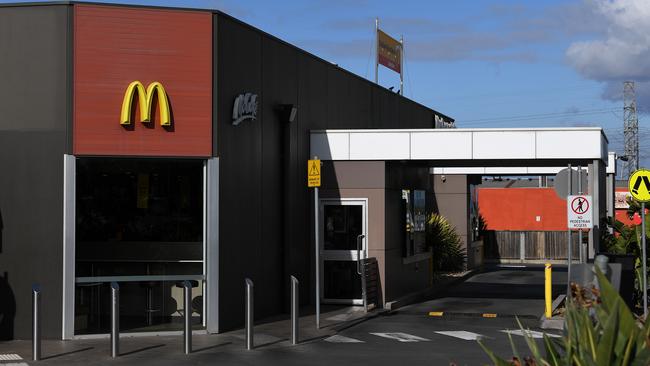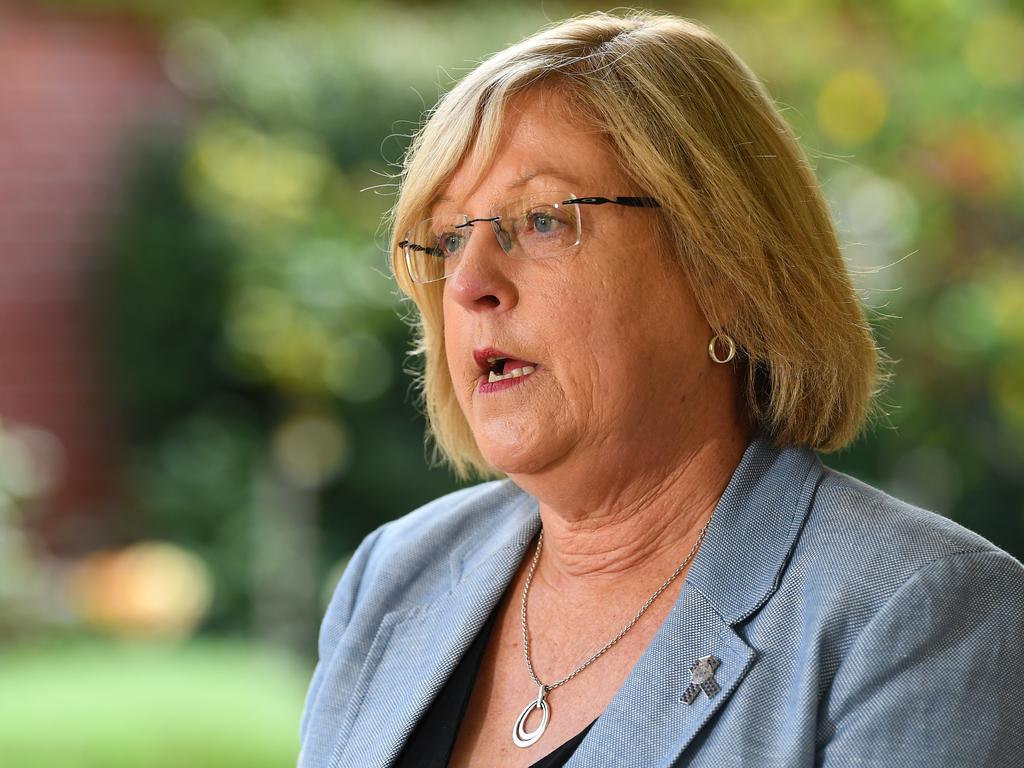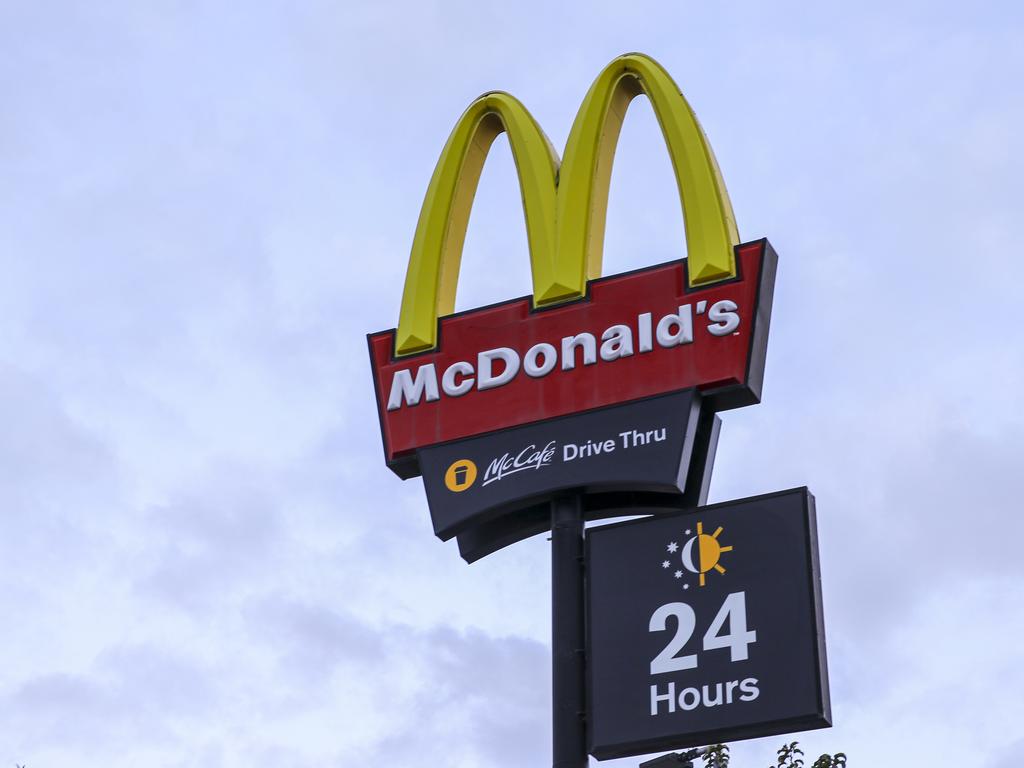Victoria’s Chief Health Officer Brett Sutton says Cedar Meats should have shut earlier
Victoria’s Chief Health Officer Brett Sutton has regrets, and admits there are parallels with the current outbreak at a Melbourne McDonald’s.

Victoria’s Chief Health Officer says he would have shut a Melbourne abattoir now linked to 90 COVID-19 cases down earlier if he had his time over, despite Andrews government Health Minister Jenny Mikakos’s claim that the cluster was handled “absolutely perfectly”.
Professor Brett Sutton’s comments come as an outbreak linked to a McDonalds in Melbourne’s north has now reached eight cases, and as he and the Department of Health and Human Services maintain the first restaurant worker to be diagnosed “wasn’t infectious while at work”.
The worker attended work on April 30 and McDonalds was notified of a positive test result on May 7, but the restaurant did not close until May 8, following a second case.
The first case in a Cedar Meats worker was detected on April 2, and a second on April 24, with a third case identified on April 26 in a worker who had been rushed to Sunshine Hospital on April 24 with a severed thumb.
Professor Sutton did not become personally involved with handling the cluster until April 29, and the abattoir was not shut down until May 1 — the same day 260 staff attended a meeting on site at which workers say social distancing practices were not enforced.
“Look, I think there’s always stuff to improve,” Professor Sutton told 3AW.
“I don’t know the absolute nitty gritty. We’ll go through a debrief to see if there’s anything to do differently, but I took a precautionary approach on this.
“I recommended that it shut and go to absolutely skeleton staffing five minutes after I heard about the third linked case, so I think I’ve acted as quickly as I possibly could.
“I think it was the first meatworks outbreak in Australia
“I think even two linked cases is probably enough to shut a place down, and probably regardless of size.
“We were proportionate inasmuch as we said everyone should be tested, consider everyone a close contact, but maybe we shouldn’t have waited for a third linked case.
“Maybe for these settings, we should shut an entire place down, not just the boning room, where it all started, but an entire facility.
“I think they’re big calls, when some of them will have 1000 plus employees, but you need to reflect on what’s happened here and what’s happened overseas.”
Professor Sutton told Victorian parliament's Public Accounts and Estimates Committee's coronavirus inquiry earlier this week that DHHS had not initially contacted workmates of the worker diagnosed on April 24, because the worker told them he had “no close contacts” due to working on a separate machine to others at the Melbourne abattoir.
Asked whether he would shut things down earlier in future, Professor Sutton said: “Yeah, I think so.”
“I think the very first linked cases that suggest that transmission’s occurred at the workplace, so I think that could be a prompt to shut it all down,” he said.
Asked if it had been a mistake for Cedar Meats to call its staff to the May 1 meeting, Professor Sutton said: “It sounds like it, if that happened.”
Cedar Meats to partially reopen on Monday
Cedar Meats management has confirmed it will restart its cold storage facility on Monday, May 18.
“Cedar Meats is not recommencing production on 18 May 2020,” a spokeswoman for the company said.

“The cold storage facility requires a minimum of staff.
“Restarting the cold storage facility has been planned with the advice and support of the public health team at the Department of Health and Human Services.
“The safety and wellbeing of staff is Cedar Meats’ number one priority.”
Professor Sutton said it had been his decision to close Cedar Meats, and not that of the Andrews government, which has links to the Kairouz family who own the abattoir.
“On the closure of a place, that’s my decision. That’s mine entirely,” he said.
However, Professor Sutton said the decision to reopen the facility would depend on assessments by WorkSafe and the local council.
“It’s not for me to approve. I think WorkSafe need to be satisfied obviously,” he said.
“I don’t know if it’s council registered, but all of those who are involved in the regulation of the site need to be happy from an occupational health and safety perspective.
“If they’re satisfied, then I’m satisfied that all of those who are returning are those who’ve either completed quarantine or are otherwise unconnected to existing staff.”
First Cedar Meats case a ‘furphy’
Asked whether he agreed with Victorian Health Minister Jenny Mikakos’s claim last week that the Cedar Meats cluster had been handled “absolutely perfectly” by DHHS and the Andrews government, Professor Sutton described the first case linked to the cluster, which was detected on April 2, almost three weeks before the second case on April 24, as a “furphy”.
The word “furphy” is Australian slang for an “erroneous or improbable story that is claimed to be factual” and derives from stories told around water carts manufactured by Shepparton business J. Furphy & Sons, which were in common usage during World War 1.
“It’s pretty clear that it’s been an explosive outbreak in terms of numbers, and we had this furphy, this earlier case who hadn’t worked there, hadn’t picked it up there, but obviously had a chain of contacts through, who knows, friends or family, and I think what’s happened is that this individual has not been at work and has picked it up through those contacts, but a number of other staff have probably imported it into the facility, probably a week or more before we picked up the (April 24) case,” Professor Sutton said.
Asked whether the staff who imported COVID-19 into the Cedar Meats facility had caught it from the April 2 case, Professor Sutton said, “No, they haven’t”.
Professor Sutton has said that the worker who tested positive on April 2 had not attended work for four weeks, but this information is based on what the worker told DHHS interviewers.
“We’ve spoken to him twice,” Professor Sutton said.
Challenged over whether the worker’s version had been checked with Cedar Meats, Professor Sutton said it had not been.
“No. We can’t give someone’s name with their private medical details,” he said.
“The Health Records Act prohibits that. It’s illegal, so we do have to work on an honesty basis with all of our outbreaks across the country.”
Asked whether it was a “coincidence” that a worker had tested positive on April 2, and others had tested positive three weeks later, Professor Sutton said: “Yeah, a coincidence in a sense. That early individual hadn’t given it to the later individuals, but they’re probably all linked through some undetermined family and friends.”
Professor Sutton said he was not aware of any link between the Cedar Meats and Fawkner McDonald’s outbreaks.
Sutton draws parallels between Cedar Meats and McDonald’s
Professor Sutton agreed there were parallels between the Cedar Meats cluster and the outbreak at McDonald’s, both of which feature initial cases where DHHS deemed a COVID-19 positive worker had not been infectious while at work, despite significant clusters subsequently emerging.

“It’s really the same situation. We’ve got a first case who didn’t work there, so hasn’t given it to any of the later cases,” he said.
Challenged over how DHHS could be confident the McDonald’s worker had not been infectious while at work on April 30, having received a positive test result on May 7 from a test conducted in the intervening days, Professor Sutton said DHHS were “pretty conservative” in their estimates.
“We look for the 48 hours before someone’s started their symptoms, and he wasn’t working at that time either, so again, (this case is) linked through other out of work contacts and it’s the later contacts who’ve been infectious at work,” he said.
Asked why the McDonald’s hadn’t been closed as soon as the first case was discovered, Professor Sutton said: “Because he hadn’t worked there while infectious, hadn’t given it to anyone else.”
Asked whether the worker could have transmitted the virus while asymptomatic, Professor Sutton said that was an “unusual” occurrence.
“You can potentially be infectious, we think, 24 hours, maybe 48 hours before symptoms have started, but he wasn’t even at the site in the 48 hours before symptoms started. He didn’t kick it off.”
Professor Sutton said it was not clear where either the Cedar Meats cluster or the McDonald’s outbreak had originated.
“There must have been community transmission out there, and it does take one individual, maybe with very mild symptoms to introduce it into those settings, and if they’re those closed settings where people do have to work much closer than normal, then they can really explode,” he said.
Fawkner McDonald’s reopened on Wednesday May 13 with staff from other outlets who the company said had not been in contact with those who usually work at the outlet.
DHHS said the restaurant had undergone a “deep clean” while closed between May 8 and May 13.








To join the conversation, please log in. Don't have an account? Register
Join the conversation, you are commenting as Logout